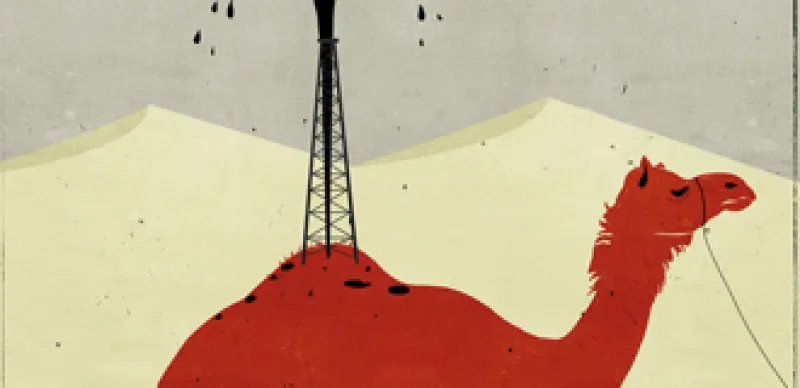The emerging markets of Europe, the Middle East and Africa are very different culturally and geographically, but in recent months have shown remarkable similarity to one another as their stock markets have recovered from crippling losses. The region’s best-performing markets, Russia’s and Turkey’s, shot up 132.1 and 117.2 percent (in local currency terms), respectively, in the 12 months through January; the worst performer, South Africa’s, gained “only” 23 percent.
“Emerging-market equities had a fantastic year,” says Roland Nash, head of research at Renaissance Capital in Moscow. “Even markets such as Africa and the Commonwealth of Independent States, which saw the biggest sell-off in the first half of last year, bounced back by leaps and bounds during the recovery.”
Investors that fled these markets in late 2008 and early 2009 spun on their heels and rushed right back when it became evident that this is where the growth is, thanks largely to rising commodities prices, while recovery in developed economies of the U.S. and Europe would proceed at a lethargic pace.
“We saw substantial money flowing back in to countries like Russia, on the back of higher oil prices, and into the Middle East–North Africa region, similarly on rising oil prices,” explains London-based Mark Iannotti, head of emerging EMEA research at BofA Merrill Lynch Global Research.
But investing in emerging markets can be a bumpy ride, as money managers were reminded in November when Dubai announced that it was unable to meet its debt payments. The news jolted a financial world still struggling to come to grips with the economic turmoil unleashed in 2008 with the collapse of Lehman Brothers Holdings in the U.S.
Investors require on-the-ground, in-the-trenches guidance from analysts who can alert them to both the risks and the opportunities in these often-volatile markets, and no firm has done a better job of providing that guidance than BofA Merrill Lynch Global Research, according to participants in the 2010 Emerging EMEA Research Team survey, Institutional Investor’s seventh annual ranking of the region’s best equity analysts. The firm captures 12 total team positions, three more than in 2009, and bumps last year’s top firm, Renaissance Capital, down a notch to No. 2; RenCap wins ten team positions. Deutsche Bank, with eight positions, jumps two spots to third place. Troika Dialog vaults from No. 8 to tie for fourth place with UBS; the firms claim seven positions each. Results are based on responses from more than 300 buy-side analysts and portfolio managers at some 240 institutions managing an estimated total of $282 billion in emerging EMEA equities.
Iannotti, an oil and gas analyst who took over as director of emerging-markets equity research in July, says BofA’s merger with Merrill at the start of 2009 resulted in little overlap in EMEA coverage. “One of the benefits of the merger was Banc of America’s strong position with respect to economic research,” he explains. “As the firms merged, our overall economics and strategy footprint improved.”
Despite the market carnage early last year, the firm cut only two emerging EMEA analyst jobs, leaving a total of 33, and increased the number of companies those analysts follow by 25 percent, from 168 stocks to 210. Coverage was expanded primarily in the Middle East and North Africa, as well as in the metals and mining sector.
“We wanted to keep the commitment to emerging markets in terms of our coverage footprint, even with the pullback from clients in terms of overall interest levels in the early part of the year,” says Iannotti. “We took the view that even though 2009 would be a difficult year, the longer-term growth will be in the emerging markets, so we were reluctant to reduce exposure.”
RenCap, by contrast, which had boasted a huge, 120-member emerging-markets troupe in 2008, cuts its team in half and slashed coverage from 325 companies to 227. Less focus was given to areas of declining investor interest, such as Kazakhstan and Ukraine, in favor of more active markets such as Nigeria and Russia.
“The crisis meant that demand for top-level equity research was decimated,” says Nash, who leads the top-ranked teams in Equity Strategy/Emerging EMEA Markets, Russia and Ukraine. “Much of the expertise the firm had built over the last decade became redundant for a period of time, as clients looked first and foremost towards liquidity and safety. We made painful cuts around the periphery but kept the core team together to rebuild after that.”
Investors were demanding more research into fixed-income instruments, with an emphasis on strategy. They also wanted help in better understanding the impact the crisis had on companies that were forced to restructure. “It was a top-down call and a turn back to basics, as the valuations were crushed,” Nash recalls.
Now, RenCap is in expansion mode again. By the end of this year, the firm hopes to expand its current research head count by 50 percent, to 90 analysts, and add 100 stocks to its coverage universe. “In the past we specialized in the CIS and to a lesser extent Africa, but now we are putting more emphasis on Africa and the Middle East and will look to build out coverage of metals and mining, and oils and gas,” he notes.
Deutsche is pursuing a similar strategy. Over the past year the German bank beefed up its coverage of the Middle East, tripling the number of analysts it has reporting on the region, from two to six, and doubling the number of companies tracked, to 40. By the middle of this year, those analysts will be following 60 companies, according to Pascal Moura, Deutsche’s Dubai-based head of emerging EMEA research.
“The industry is still young and immature, and coverage is still quite poor,” Moura notes. He expects interest from money managers to increase as performance catches up to that of other emerging markets, but the crisis in the United Arab Emirates has taken a toll on investor confidence — and market performance.
“A 50 percent correction in real estate prices in Dubai, coupled with Dubai World’s shocking debt-standstill request, which broke relatively late during the year, led to another correction towards the end of the year in Dubai and some neighboring markets,” he says. As a result, “Middle East markets were fairly disappointing compared to the 100 percent-plus performances from Turkey and Russia.”
Deutsche also restructured its emerging EMEA research operations in the wake of the financial crisis, reducing head count from 54 to 45. “The only thing we had a good grip on was cost, so we reduced cost, and that resulted in a reduction in the number of analysts,” Moura explains. Even so, the firm increased the number of companies it follows from 252 to 294. “We have managed to cover more stocks, despite the staff reductions, by cutting into support staff — not coverage analysts — and increasing the amount of support offshore,” he adds.
VTB Capital, a newcomer to this ranking, shoots straight in at No. 7. The firm, which went public three years ago in an $8 billion initial public offering — the world’s largest IPO in 2007 — has been aggressively hiring analysts from other outfits to build up its equity research operations. Undeterred by the global economic crisis, the firm forged ahead with its plans, expanding coverage from 20 to 72 stocks last year and increasing its number of analysts from 32 to 36.
“Our research team was built from scratch with professionals from Deutsche Bank, Credit Suisse, UBS, Barclays, Morgan Stanley and local brokers,” explains Alexei Yakovitsky, VTB’s Moscow-based head of equity research.
Commodities research is key to his firm’s success, he says. “You can not underestimate the importance of commodities research for a country like Russia,” Yakovitsky explains, noting that the country “has always been a high-beta play on the global economy — when things are good and oil prices are high, the markets perform better than in the developed world, but when things are bad, the markets go down more than the others.”
Things were definitely bad in late 2008. “Russia was hammered,” Yakovitsky says. “Foreign investors pulled money out, selling assets and causing the market to go down on concerns that the economy was going to drop substantially.” All that began to change when oil prices started rising last spring.
Investor interest began to rise too, but there is still concern about the stability of local economies — in Russia and other emerging markets — and the sustainability of the recovery. Many firms say it’s too soon to shift the focus away from macroeconomic research, but when the time comes, they will be ready. “As equities become more expensive, we will re-enter a stock-picking phase in this market,” predicts BofA’s Iannotti.






